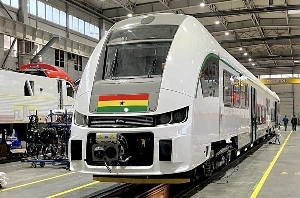Business News of Sunday, 14 September 2014
Source: Ghanaian Times
400 Local vessels stopped from fishing
Four hundred inshore local fishing vessels cannot fish in the country’s waters because they do not have license.
The Deputy Director of Fisheries Commission, Mr. Godfred Baidoo-Tsibu, who disclosed this on during a meeting with owners of trawling vessels, said the Commission would arrest crew members and confiscate fish on board any such vessel found fishing without licence.
Inshore vessels are mostly medium-sized wooden vessels used for fishing purposes. They have hatches to store fish for a few days.
Under the Fisheries Law, Act 625, tuna vessels, trawlers and inshore fishing vessels are supposed to obtain licences annually, before fishing in the country’s waters.
The meeting was aimed at sensitising participants on the importance of the Vessel Monitoring Systems (VMS) and to collate their concerns for necessary action.
Mr. Baidoo-Tsibu, who is also the Head of Marine Security Committee, noted that in line with their mandate to regulate and manage fisheries resources in the country, they had completed installing VMS on 79 trawlers out of a target of 106.
According to him, the remaining 27 could not be installed because the vessels were due to be scraped, or were under maintenance in the country or in China.“We would keep an eye on them to ensure that they do not operate without the VMS, he stated
During the installation exercise which started from August 10 to September 1, he said it was observed that 50 per cent of the trawlers did not have maritime mobile service identity numbers, a nine digit number used by the international maritime organisation to identify vessels.
Mr. Baidoo-Tsibu said the commission, therefore, approached the National Communications Authority for assistance.
He advised the participants not to temper with the VMS because it would help in the monitoring of their activities whether at port, sea or for search and rescue operations in times of distress.
Mr. Baidoo-Tsibu also advised those in charge of trawlers not to fish in the 30 metre contour zone reserved for artisanal fishermen, or stray into other countries’ exclusive economic zones without the appropriate license.
The 39 tuna vessels operating in the country have already been fitted with VMS.
The Director of Fisheries Scientific Survey Division, Paul Bannerman, said the World Bank was assisting Ghana to acquire a $4 million research vessel by March next year, to identify the various types of fish in the country’s sea by way of sizes, quantity and spawning grounds to be able to guide fishermen in their trade.
A Supervisor at the Marine Security Section of West African Gas Pipeline (WAPCO), Cdr Ignatius Minyila, (rtd), advised the participants to ensure that trawlers did not operate near the West Africa Gas pipeline because it could have serious consequences for crew, vessel and the pipeline.
The participants called for more interactions between them and the commission to deliberate on current issues in the sector.
They expressed worry that oil and gas exploration activities in the country seemed to be limiting their fishing grounds and having a toll on their activities.
The participants, therefore, decided to put a proposal together to government to consider compensating them from proceeds accruing from that business.











